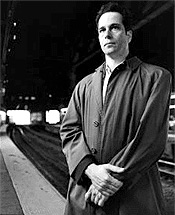Lecture: Philip Gourevitch
RELATED:
"The press should not simply be the scribes": Philip Gourevitch at NYU
The award-winning journalist Philip Gourevitch spoke about his experience as a campaign writer for The New Yorker on September 15, 2004, in the NYU Department of Journalism.
Gourevitch called for a change in the way politics are covered, a more unconventional approach than the one currently used by the newsmedia.
"Unconventional" is actually a good word to describe the writer himself. At the start of his writing career, Gourevitch took three years off from college, during which he "sat in a chair and wrote."
"I suppose I was making sure [I wanted to be a writer]," said Gourevitch. He thought he wanted to be a writer, he recalled, but "unless I could sit in a chair on my own and write, that was not the job for me and, also, what if I didn't like it?"
Not everyone approved of his monastic regimen.
"Some people [said], 'Why don't you go back to school?,'" said Gourevitch. "[They said], 'You're wasting time. It's like reinventing the wheel. Well, if I'm going to spend my whole life working with wheels, maybe I ought to learn how to make one. I was learning the craft."
In addition to polishing his writerly craftsmanship, Gourevitch gave some thought to journalism's role in society. He decided that certain journalistic conventions, such as striving for balance and objectivity, can sometimes lead to a misrepresentation of the facts.
"If you give equal weight to every story, that means that anybody can say just about anything," he said. "I thought the job of a journalist was not only to be objective but also to seek out the truth and to dismiss and disregard that which is false and not to maintain a false debate for the sake of a story."
"If you give equal weight to every story, that means that anybody can say just about anything. I thought the job of a journalist was...to seek out the truth and...not to maintain a false debate for the sake of a story."
For example, when Gourevitch covered the 1994 genocide in Rwanda, in which the Hutu majority killed the Tutsi minority, he found that many journalists didn’t tell the story right. There was a clear distinction between the killers and the victims, but newspapers often told the story as the Hutus and Tutsis killing one another, Gourevitch said.
“They sort of treat the fact that there are tensions between these groups over time as if it means that they are equal and that their claims and their complaints and their actions are equal,” he said, “It was a way of telling the story that created enormous and dangerous misunderstanding - dangerous in the sense that it led people to make actions that were actually responding to a false representation of the situation.”
After the RPF (Rwandan Patriotic Front) overthrew the genocide regime, various genocide leaders and thousands of Hutus fled to Zaire, where they stayed in UN camps. So the UN provided aid to people who were guilty of commiting genocide, and this Gourevitch said, was partly due to a misrepresentation of the facts.
In his book, We wish to inform you that tomorrow we will be killed with our families, Gourevitch interviewed the president of the genocidal regime, Theodore Sindikubwabo, who was living in exile in Bukavu, Zaire.
Sindikubwabo told Gourevitch that he was open to “a frank and sincere dialogue about the management of Rwanda” with the post-genocide government.
In response, Gourevitch asked if anyone would want to negotiate with a man known to be a murderer.
Sinkikubwabo laughed and said, “The moment has not yet come to say who is guilty and who is not guilty.”
"He gave me a whole lecture about objectivity.” Gourevitch recalls, “He said, 'Why don't you be objective?' And I said, 'Objectively, you could be a mass murderer.' He hadn't really thought about that."
In some ways, Gourevitch said, Sindikubwabo used the concept of objectivity as a way to escape blame and avoid discussion about the genocide.
But avoiding discussion is not unique to Sindikubwabo.
With this year’s election campaign, Gourevitch is concerned about politicians' avoidance of any substantive discussion of controversial issues and events such as the weapons of mass destruction allegedly possessed by Saddam Hussein, 9-11’s role in foreign and domestic policy, and the Abu Ghraib prison scandal.
"One problem is [that] the press is up against a very skilled [political] machine that doesn't want to debate these issues and then prepares to make them non-issues," he said. "Iraq has not been an issue."
Even so, he said, journalists should demand answers and generate discussion. "The press should not simply be the scribes of whatever storyline the campaigners want to put out," he said.
Unfortunately, Gourevitch often found that to be the case. He compared his experience covering the Democratic primaries in Iowa to being on a New York City bus tour.
"You know when you're in New York and you see those people get on the bus and get off the bus and they get shown the exact same thing that the last people took a picture of and they all take the same picture and they all get back on the bus and go to a restaurant that says 'We serve buses'?," said Gourevitch. "It's very strange, [but] that's exactly what being a member of the press for a campaign is like."
Gourevitch believes that it is journalists' fear of losing access to political sources that is at least partly to blame for their willingness to let politicians to skirt the issues.
"I'm not against access," he said. "I think it's always good to talk to everybody. The problem is when the price of wanting access is that you in some ways accommodate [your sources] rather than being as free and independent as you might otherwise be."
Sometimes, said Gourevitch, the most popular sources are not necessarily the best ones "because you can get a lot of information without actually talking to the principle person."
Gourevitch also questions the fact that, when specialized subject areas such as health care or weapons systems come up in political debates, such issues are still handled by political reporters, rather than being covered by journalists well-versed in those particular beats.
Gourevitch thinks that this should change. The information provided by journalists can greatly influence public decisions, especially during elections, he contends.
Gourevitch is committed to a journalism whose social role is keeping the authorities in line—a journalism some might call activist. "There is an activist element, obviously, in the kind of journalism where you try to expose political crimes or war crime or certain kinds of abuses by power," he conceded. "I think journalists have done a good job in exposing these things."
At the same time, he is skeptical of journalists' ability to change society on their own.
"If I go in there, I'll tell the story," said Gourevitch. "If somebody else wants read it and then go change the world, that's good. But I also don't know if they'll change it for the better. No matter what the cause is, to make justice or to expose war crimes, the first ingredient is going to be knowledge and awareness and that's the part that we provide."


